将来完成时与将来进行时与一般将来时区别
将来进行时-将来完成时--将来完成进行时
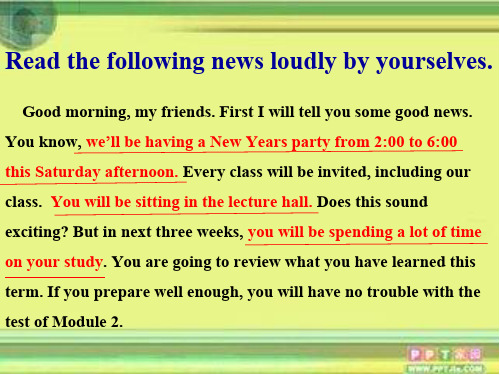
将来进行时也可以与一般将来时换用,但有 细微差别:
﹛I won’t see him while I’m in Shanghai. 在上海时我不会去看他 I won’t be seeing him while I’m in Shanghai. 在上海时我不会见到他
﹛Won’t you come with us ?你不想和我们一起 去吗?(邀请) Won’t you be coming with us ?你不和我们一 起去吗?(单纯谈事实)
• The train will have left when we get to the station.
经常与before+将来时间或by+将来时间连 用,也可与before或by the time引导的现在 时的从句连用。
1.We shall have learned 12 units by the end of this term.
将来进行时
将来进行时的构成
陈述句中:shall/will+be+V-ing 否定句中:shall/will not be+V-ing 一般疑问句:Shall/Will+主语+be+doing? 特殊疑问句:特殊疑问+will/shall+be+doing?
将来进行时的用法
1. What will you be doing on Saturday? 2. This is tomorrow we'll be sitting in the cinema and watching a film.
一般将来时与将来进行时区别:
(a) We’ll fly to Morocco, in northern Africa soon.
动词时态与语态总结

动词时态与语态总结动词时态和语态是英语语法中的重要概念,准确运用时态和语态可以使语言更加准确、流畅。
本文将对动词时态和语态进行总结和归纳,帮助读者更好地掌握这方面的知识。
一、动词时态1. 一般现在时(Simple Present Tense)一般现在时表示经常性、习惯性或普遍真理的动作或状态。
句子结构为主语+动词原形。
Example: She dances every evening.(她每天晚上跳舞。
)2. 一般过去时(Simple Past Tense)一般过去时表示过去发生的动作或状态。
句子结构为主语+动词过去式。
Example: They went to the park yesterday.(昨天他们去了公园。
)3. 一般将来时(Simple Future Tense)一般将来时表示将来发生的动作或状态。
句子结构为主语+will/shall+动词原形。
Example: I will travel to London next week.(我下周将去伦敦。
)4. 现在进行时(Present Continuous Tense)现在进行时表示现在正在进行的动作。
句子结构为主语+be动词+动词-ing形式。
Example: She is studying at the library.(她正在图书馆学习。
)5. 过去进行时(Past Continuous Tense)过去进行时表示过去某个时间正在进行的动作。
句子结构为主语+was/were+动词-ing形式。
Example: They were having dinner when the phone rang.(电话响时,他们正在吃晚饭。
)6. 将来进行时(Future Continuous Tense)将来进行时表示将来某个时间正在进行的动作。
句子结构为主语+will/shall+be+动词-ing形式。
Example: We will be waiting for you at the airport tomorrow.(明天我们将在机场等你。
一般将来时,将来进行时,将来完成时
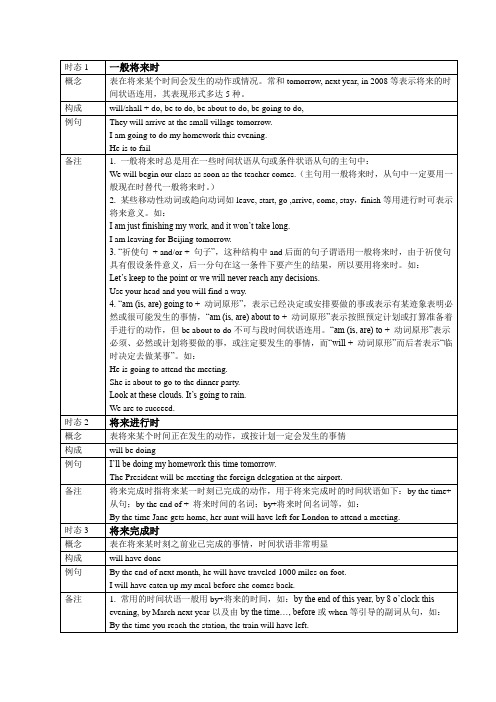
1.I won’t be able to attend the meeting tonight because____then.A. I must have a classB. I will be teaching a classC. I teach a classD. I will have taught a class2. -----Could you give these books to Mr. Black?-----Absolutely, ___ him at five this afternoon.A. I will have a talk withB. I have a talk withC. I can have a talk withD. I will be having a talk with3. I’m afraid I won’t be available then. I ___ a friend at three this afternoon.A. seeB. am seeingC. will seeD. will be seeing4. Next Friday I will go to another concert. They ____ some thing by Mozart at that time.A. playB. will be playingC. are going to playD. are to play5. -----What are you doing, Jack?-----Make a model plane. I ____ it in the science class at 10 o’clock tomorrow morning.A. will be showingB. am going to showC. showD. have showed1. 下星期这时候我们将在那个工厂劳动。
将来进行时与将来完成时
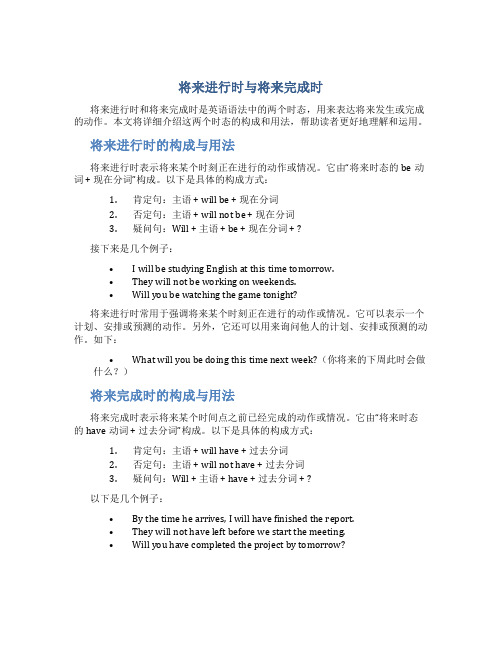
将来进行时与将来完成时将来进行时和将来完成时是英语语法中的两个时态,用来表达将来发生或完成的动作。
本文将详细介绍这两个时态的构成和用法,帮助读者更好地理解和运用。
将来进行时的构成与用法将来进行时表示将来某个时刻正在进行的动作或情况。
它由“将来时态的be动词 + 现在分词”构成。
以下是具体的构成方式:1.肯定句:主语 + will be + 现在分词2.否定句:主语 + will not be + 现在分词3.疑问句:Will + 主语 + be + 现在分词 + ?接下来是几个例子:•I will be studying English at this time tomorrow.•They will not be working on weekends.•Will you be watching the game tonight?将来进行时常用于强调将来某个时刻正在进行的动作或情况。
它可以表示一个计划、安排或预测的动作。
另外,它还可以用来询问他人的计划、安排或预测的动作。
如下:•What will you be doing this time next week?(你将来的下周此时会做什么?)将来完成时的构成与用法将来完成时表示将来某个时间点之前已经完成的动作或情况。
它由“将来时态的have动词 + 过去分词”构成。
以下是具体的构成方式:1.肯定句:主语 + will have + 过去分词2.否定句:主语 + will not have + 过去分词3.疑问句:Will + 主语 + have + 过去分词 + ?以下是几个例子:•By the time he arrives, I will have finished the report.•They will not have left before we start the meeting.•Will you have completed the project by tomorrow?将来完成时通常用于描述在将来某个时间点之前已经发生或完成的动作。
高三英语过去完成时、将来完成时、现在完成进行时、将来进行时
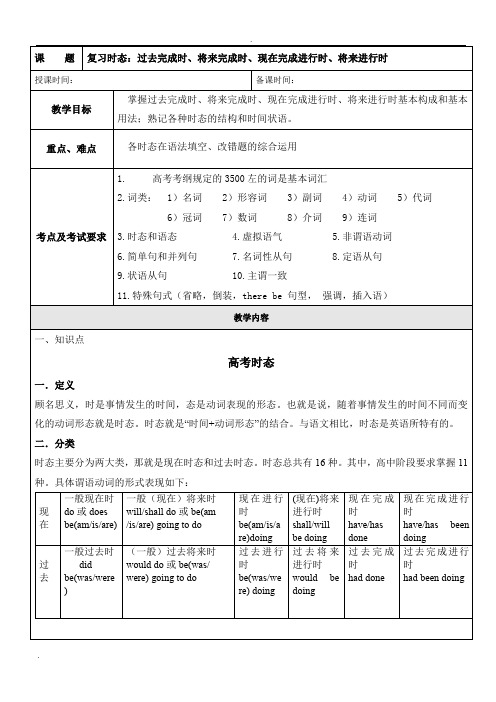
课后作业一、真题演练:单句语法1. When I die, I ____________(give) everything to you.2. That was definitely not an attractive idea, so I politely declined her invitation, .____________(close) m y book and walked away.3. His fear of failure __________(keep) him from classroom games that other students played with joyousabandon.4. _______________(speak) out your inner feeling won’t make you feel ashamed, on the contrary,5. _____________(complete) the project as planned, we’ll have to work two more hours a day.6.It was raining lightly when I___61___ (arrive) in Yangshuo just before dawn.7. This cycle 48 (go) day after day:The walls warm up during the day and cool off during the night and are thus always a timely offset(抵消) for the outside temperatures.8. In 1969,the pollution was terrible along the Cuyahoga River near Cleveland,Ohio.It 61 (be) unimaginable that it could ever be cleaned up.9. Be patient!Tai Chi 66 (call) “shadow boxing” in English.It asks you to act like water:10.Unless some extra money (find),the theatre will close11.When a new day breaks,the walls have given up their heat and are now cold enough 46 (cool) the house during the hot day;at the same time,they warm up again for the night.12. In addition to their simple beauty,what makes the adobe dwellings admirable is their ability to “air condition” a house wi thout 44 (use) electric equipment.13. The adobe dwellings(土坯房) 41 (build) by the Pueblo Indians of the American Southwest are admired by even the most modern of architects and engineers.二、单选题1. When I was young, I ________ with my grandma in the countryside, which is unforgettable.A. livedB. have livedC. was livedD. had lived2. –Excuse me, is the book Gone with the Wind by Margaret Mitchell available now?-Sorry, but it _________ so well that we don’t have any in store.A. sellsB. is soldC. has soldD. has been sold3. The tourism of Linyi _________ rapid growth over the last decade. Now it’s the second most visited city in Shandong Province.A. sawB. had seenC. is seeingD. has seen4. Great changes _____place in my hometown during the past three decades.A. tookB. have takenC. were takenD. have been taken5.Leave me alone. I ________ an article all the afternoon and haven’t finished yet.A. writeB. have been writingC. have writtenD. wrote6. When the power of love _______ the love of power, the world will likely be in peace.A. overcomesB. will overcomeC. is overcomingD. overcame7. Mr. Black ________ Shanghai in a few days. Shall we have a party?A. leavesB. is leavingC. leftD. has left8. –Look, it _________ again.–Yeah. This is the third snow we __________ this spring.A. will snow, are havingB. has snowed, had hadC. is snowing, have hadD. snows, have had9. Mr. White ____ in our school for nearly forty years before he retired last month.A. workedB. has workedC. had workedD. would work10. The project ________ to developing the economy and reducing poverty when it is completed.A. has contributedB. had been contributedC. will contributeD. is contributed11. Nelson Mandela __________ peacefully at his Johannesburg home on Thursday, President Jacob Zuma said.A. diesB. diedC. has diedD. was died12. –I thought you _____________ for vacation tomorrow.-I had planned, but I have a very important meeting to attend tomorrow.A. will leaveB. are leavingC. have leftD. were leaving13. Our manager ________for Shanghai in a few days and he has asked me to find out when the earliest plane ________ next Wednesday.A. is leaving, takes offB. will leave, is taking offC. leaves, will take offD. is to leave, is going to take off14. I’m calling about the apartment you ______the other day .Could you tell me more about it?A .advertised B. had advertised C. were advertising D. will advertise15. Whenever you______a present, you should think about it from the receiver’s point of view.A. boughtB. have boughtC. will buyD. buy16. I walked slowly through the market, where people ______ all kinds of fruits and vegetables. I studied the prices carefully and bought what I needed.A. sellB. were sellingC. had soldD. have sold17. The twins, who _______ their homework, were allowed to play badminton on the playground.A. will finishB. finishC. have finishedD. had finished18. The journey was tiring! All the seats in the train _______. I had to stand all the way.A. were occupiedB. would be occupiedC. would occupyD. had occupied19. Yesterday afternoon, I ______my homework when Mary called.A. had doneB. was doingC. would doD. am doing20. Close the door of fear behind you, and you ______ the door of faith open before you.A. sawB. have seenC. will seeD. are seeing21. Tommy is planning to buy a car. By next month ,he____ enough for a used one.A. saves B .saved C. will save D. will have saved22. She was surprised to find the fridge empty; the child _____ everything!A. had been eatingB. had eatenC. have eatenD. have been eating23. Despite the previous rounds of talks, no agreement______ so far by the two sides.A. has been reachedB. was reachedC. will reachD. will have reached24. More expressways _______in Sichuan soon to promote the local economy.A. are being builtB. will be builtC. have been builtD. had been built25 After school we went to the reading-room to do some reading, only to be told that it _____.A. was decoratedB. had decoratedC. had been decoratingD. was being decorated三、语法填空(共10小题;每小题1.5分,满分15分)阅读下面短文,在空白处填入1个适当的单词或括号内单词的正确形式。
be动词的时态变化
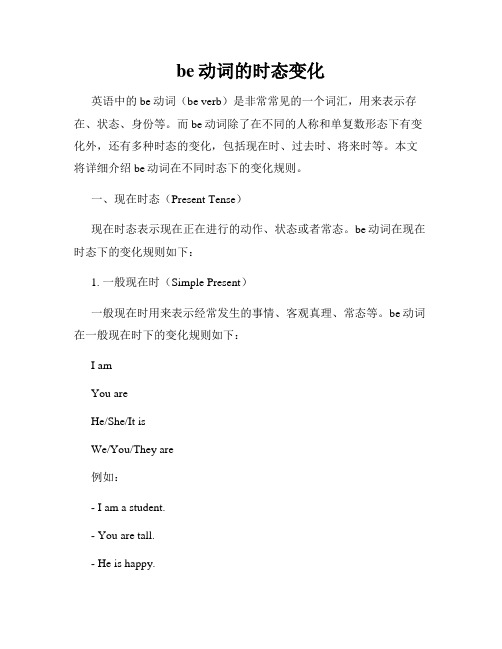
be动词的时态变化英语中的be动词(be verb)是非常常见的一个词汇,用来表示存在、状态、身份等。
而be动词除了在不同的人称和单复数形态下有变化外,还有多种时态的变化,包括现在时、过去时、将来时等。
本文将详细介绍be动词在不同时态下的变化规则。
一、现在时态(Present Tense)现在时态表示现在正在进行的动作、状态或者常态。
be动词在现在时态下的变化规则如下:1. 一般现在时(Simple Present)一般现在时用来表示经常发生的事情、客观真理、常态等。
be动词在一般现在时下的变化规则如下:I amYou areHe/She/It isWe/You/They are例如:- I am a student.- You are tall.- He is happy.2. 现在进行时(Present Continuous)现在进行时用来表示现在正在进行的动作。
be动词在现在进行时下的变化规则如下:I am beingYou are beingHe/She/It is beingWe/You/They are being例如:- I am studying.- You are watching TV.- He is writing a letter.3. 现在完成时(Present Perfect)现在完成时用来表示过去发生的动作对现在的影响。
be动词在现在完成时下的变化规则如下:I have beenYou have beenHe/She/It has beenWe/You/They have been例如:- I have been to France.- You have been busy.- He has been sick.二、过去时态(Past Tense)过去时态表示过去发生的动作或者存在的状态。
be动词在过去时态下的变化规则如下:1. 一般过去时(Simple Past)一般过去时用来表示过去发生的动作或存在的状态。
动词时态规则

动词时态规则动词时态是指动词在不同时间点所表示的动作或状态的形式。
根据英语语法规则,动词时态分为以下几种:一般现在时、一般过去时、一般将来时、现在进行时、过去进行时、将来进行时、现在完成时、过去完成时、将来完成时、现在完成进行时、过去完成进行时、将来完成进行时等。
本文将介绍这些动词时态的规则以及其用法。
一、一般现在时 (Simple Present Tense)一般现在时表示经常发生或普遍存在的动作、状态或观点。
一般现在时的构成为:主语 + 动词原形。
1. 行为动词的一般现在时:a. 第三人称单数主语,动词要加-s或-es。
例如:He plays football every Sunday.(他每个星期天踢足球。
)b. 非第三人称单数主语,动词使用原形。
例如:I like to read books.(我喜欢读书。
)2. 非行为动词(状态动词)的一般现在时:非行为动词指表示状态,感官或存在等的动词。
在一般现在时中,它们保持不变。
例如:She feels happy when she sings.(她唱歌时感到非常快乐。
)二、一般过去时 (Simple Past Tense)一般过去时表示过去发生的具体动作、状态或习惯动作。
一般过去时的构成为:主语 + 动词过去式。
1. 行为动词的一般过去时:a. 所有人称主语,动词使用过去式。
例如:They watched a movie last night.(他们昨晚看了一部电影。
)b. 动词过去式为不规则动词的规则形式。
例如:She went to school yesterday.(她昨天去上学了。
)2. 非行为动词(状态动词)的一般过去时:非行为动词在一般过去时中,仍保持不变。
例如:I knew the answer to the question.(我知道问题的答案。
)三、一般将来时 (Simple Future Tense)一般将来时表示将要发生的动作、事件或存在的状态。
语法解析——动词的时态变化与用法

语法解析——动词的时态变化与用法动词是语言中最基本的词类之一,它用来表示动作、状态和存在等概念。
动词的时态变化和用法在语法学中占据着重要的地位。
本文将对动词的时态变化和用法进行解析和探讨。
一、动词的时态变化动词的时态变化主要包括一般现在时、一般过去时、一般将来时、现在进行时、过去进行时、将来进行时、现在完成时、过去完成时、将来完成时等。
下面将对这些时态进行详细解析。
1. 一般现在时一般现在时表示经常性的、习惯性的或普遍性的动作、状态或真理。
它的基本结构是主语+动词原形。
例如:I play basketball every Sunday.(我每个星期天打篮球。
)2. 一般过去时一般过去时表示过去某个时间发生的动作或状态。
它的基本结构是主语+动词过去式。
例如:She studied English in college.(她在大学学习英语。
)3. 一般将来时一般将来时表示将来某个时间要发生的动作或状态。
它的基本结构是主语+will/shall+动词原形。
例如:I will visit my grandparents next week.(我下周要去看望我的祖父母。
)4. 现在进行时现在进行时表示现在正在进行的动作或状态。
它的基本结构是主语+be动词+动词ing形式。
例如:They are playing soccer in the park.(他们正在公园里踢足球。
)5. 过去进行时过去进行时表示过去某个时间正在进行的动作或状态。
它的基本结构是主语+was/were+动词ing形式。
例如:He was studying when I called him.(我给他打电话时,他正在学习。
)6. 将来进行时将来进行时表示将来某个时间正在进行的动作或状态。
它的基本结构是主语+will be+动词ing形式。
例如:They will be traveling to Europe this summer.(他们今年夏天将会去欧洲旅行。
- 1、下载文档前请自行甄别文档内容的完整性,平台不提供额外的编辑、内容补充、找答案等附加服务。
- 2、"仅部分预览"的文档,不可在线预览部分如存在完整性等问题,可反馈申请退款(可完整预览的文档不适用该条件!)。
- 3、如文档侵犯您的权益,请联系客服反馈,我们会尽快为您处理(人工客服工作时间:9:00-18:30)。
将来完成时与将来进行时与一般将来时区别
将来完成时
1)构成will/shall+have+p.p.
2)概念
a.状态完成:表示某事继续到将来某一时为止一直有的状态。
b.动作完成:表示将来某一时或另一个将来的动作之前,已经完成
的动作或已获得的经验。
将来完成时用来表示在将来某一时间以前已经完成或一直持续的动作。
经常与before+将来时间或by+将来时间连用,也可与before或by the time引导的现在时的从句连用。
如:
He will have gained his pilot's license before his next birthday .他下个生日前会拿到飞行证的。
You will have received an invitation to the wedding as well.你肯定会收到参加婚宴的邀请的。
They will have been married for20years by then.
You will have reached Shanghai by this time tomorrow.
将来进行时
1)概念:表示将来某时进行的状态或动作,或按预测将来会发生的事情。
She'll be coming soon.
I'll be meeting him sometime in the future.
注意:将来进行时不用于表示"意志",不能说I'll be having a talk with her.
2)常用的时间状语
Soon,tomorrow,this evening,on Sunday,by this time,tomorrow,in two days,tomorrow evening
By this time tomorrow,I'll be lying on the beach.
一般将来时
1)shall用于第一人称,常被will所代替。
will在陈述句中用于各人称,在争求意见时常用于第二人称。
Which paragraph shall I read first.
Will you be at home at seven this evening?
2)be going to+不定式,表示将来。
a.主语的意图,即将做某事。
What are you going to do tomorrow?
b.计划,安排要发生的事。
The play is going to be produced next month。
c.有迹象要发生的事
Look at the dark clouds,there is going to be a storm.
3)be+不定式表将来,按计划或正式安排将发生的事。
We are to discuss the report next Saturday.
4)be about to+不定式,意为马上做某事。
He is about to leave for Beijing.
注意:be about to不能与tomorrow,next week等表示明确将来时的时间状语连用。
